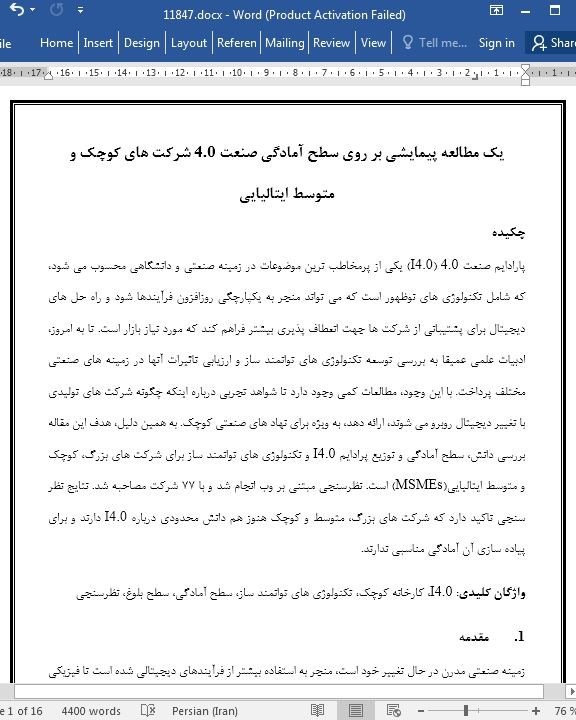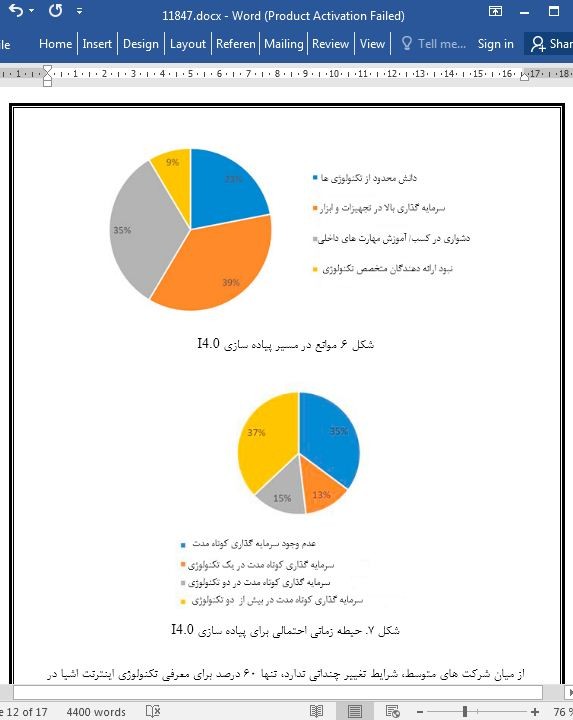
یک مطالعه پیمایشی بر روی سطح آمادگی صنعت 4.0 شرکت های کوچک و متوسط
چکیده
پارادایم صنعت 4.0 (I4.0) یکی از پرمخاطب ترین موضوعات در زمینه صنعتی و دانشگاهی محسوب می شود، که شامل تکنولوژی های نوظهور است که می تواند منجر به یکپارچگی روزافزون فرآیندها شود و راه حل های دیجیتال برای پشتیبانی از شرکت ها جهت انعطاف پذیری بیشتر فراهم کند که مورد نیاز بازار است. تا به امروز، ادبیات علمی عمیقا به بررسی توسعه تکنولوژی های توانمند ساز و ارزیابی تاثیرات آنها در زمینه های صنعتی مختلف پرداخت. با این وجود، مطالعات کمی وجود دارد تا شواهد تجربی درباره اینکه چگونه شرکت های تولیدی با تغییر دیجیتال روبرو می شوند، ارائه دهد، به ویژه برای نهاد های صنعتی کوچک. به همین دلیل، هدف این مقاله بررسی دانش، سطح آمادگی و توزیع پرادایم I4.0 و تکنولوژی های توانمند ساز برای شرکت های بزرگ، کوچک و متوسط ایتالیایی(MSMEs) است. نظرسنجی مبتنی بر وب انجام شد و با 77 شرکت مصاحبه شد. نتایج نظر سنجی تاکید دارد که شرکت های بزرگ، متوسط و کوچک هنوز هم دانش محدودی درباره I4.0 دارند و برای پیاده سازی آن آمادگی مناسبی ندارند.
1. مقدمه
زمینه صنعتی مدرن در حال تغییر خود است، منجر به استفاده بیشتر از فرآیندهای دیجیتالی شده است تا فیزیکی که افزایش رضایت مشتری، ارتقا دانش، کاهش ناکارایی، بهبود توانایی تصمیم گیری را امکان پذیر می سازد. همراه با تکنولوژی های سنتی و پارادایم های مدیریتی/ سازمانی نهادینه شده، تکنولوژی های دیجیتالی جدید و در نتیجه رویکردهای جدید مدیریتی در حال ظهور است، که می توانند از شرکت ها برای انعطاف پذیری بیشتر که نیاز بازار است، پیشتیبانی کند [1]،[2].
محدودیت ها و تحقیقات آتی
این تحقیق محدودیت هایی دارد که فرصت های جدیدی برای تحقیقات آتی پیشنهاد می کند. ابتدا، پژوهش ما نهادهای بخش های صنعتی مختلف را مد نظر قرار می دهد و هر بخش دارای ویژگی های خاصی است. این امر با توجه به ابعاد مختلف تحلیل شده نظر سنجی، بر اعتبار تاثیر می گذارد. تحلیل تفصیلی تر تفاوت های میان بخش ها می تواند مناسب باشد. ویژگی مهم دیگر نمونه ما این است که ما بخش کوچکی از جمعیت شرکت های کوچک و متوسط را مد نظر قرار دادیم، از اینرو این مقاله را می توان اولین پژوهش اکتشافی در نظر گرفت. بنابراین، تحلیل ما را می توان برای کسب یافته های معنادار تر تعمیم داد.
Abstract
The Industry 4.0 (I4.0) paradigm is considered one of the most trending topics in the academic and industrial context, that involves emerging technologies that can make the processes increasingly integrated and provide digital solutions for supporting companies towards the greater flexibility required by the market. To date, the scientific literature strongly addressed the development of enabling technologies and the assessment of their impacts in different industrial contexts. However, there is a lack of studies providing empirical evidence about how manufacturing companies are facing the digital transformation, in particular for smaller industrial realities. For this reason, this paper aims to study the knowledge, readiness, and dissemination level of the I4.0 paradigm and enabling technologies for Italian Micro, Small, and Medium Enterprises (MSMEs). A web-based survey was conducted, and 77 companies were interviewed. The survey results underline that MSMEs still have limited knowledge about I4.0 and are not well prepared for its implementation.
1. INTRODUCTION
The modern industrial context is transforming itself, making more use of digital rather than physical processes that allow to increase customer satisfaction, enhance knowledge, reduce inefficiencies, and improve the ability to decide. Alongside traditional production technologies and established organizational/ management paradigms, new digital technologies are emerging and consequently new managerial approaches, capable of supporting companies towards the greater flexibility required by the market. [1],[2].
Limitations and future research
This research has some limitations offering new opportunities for future research. Firstly, our work considers enterprises from different industrial sectors and each sector has its characteristics. This naturally affects the relevance given to the different survey dimensions analyzed. A more detailed analysis of differences among sectors could be relevant. Another important characteristic of our sample is that we have considered a small part of the population of small and medium-sized enterprises since the paper can be considered as a first exploratory study. Therefore, our analysis could be extended to gain a more significant finding.
چکیده
1. مقدمه
2. روش شناسی
3. نتایج
3.1. زمینه رقابتی شرکت
3.2. توسعه نوآوری
3.3. سطح آگاهی از I4.0
3.4. مزایا و موانع
3.5. پیشنهادات و پیشرفت های آتی
4. بحث و نتیجه گیری ها
محدودیت ها و تحقیقات آتی
ضمیمه A
منابع
Abstract
1. INTRODUCTION
2. METHODOLOGY
3. RESULTS
3.1. Company competitive context
3.2. Innovation development
3.3. I4.0 awareness level
3.4. Benefits and obstacles
3.5. Future development and suggestions
4. DISCUSSIONS AND CONCLUSIONS
Limitations and future research
Appendix A.
References
- اصل مقاله انگلیسی با فرمت ورد (word) با قابلیت ویرایش
- ترجمه فارسی مقاله با فرمت ورد (word) با قابلیت ویرایش، بدون آرم سایت ای ترجمه
- ترجمه فارسی مقاله با فرمت pdf، بدون آرم سایت ای ترجمه



